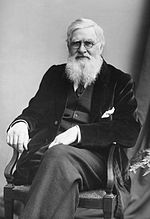Alfred Russel Wallace, Date of Birth, Place of Birth, Date of Death
TweetAlfred Russel Wallace
British naturalist, explorer, geographer, anthropologist and biologist
 Date of Birth: 08-Jan-1823
Date of Birth: 08-Jan-1823
 Place of Birth: Usk, Monmouthshire, Wales, United Kingdom
Place of Birth: Usk, Monmouthshire, Wales, United Kingdom
Date of Death: 07-Nov-1913
Profession: naturalist, writer, mathematician, zoologist, beekeeper, biologist, geographer, ornithologist, botanist, entomologist, anthropologist, explorer, anti-vaccine activist
Nationality: Wales
Zodiac Sign: Capricorn 
About Alfred Russel Wallace
- Alfred Russel Wallace (8 January 1823 – 7 November 1913) was a British naturalist, explorer, geographer, anthropologist, biologist and illustrator.
- He is best known for independently conceiving the theory of evolution through natural selection; his paper on the subject was jointly published with some of Charles Darwin's writings in 1858.
- This prompted Darwin to publish his own ideas in On the Origin of Species. Like Darwin, Wallace did extensive fieldwork; first in the Amazon River basin, and then in the Malay Archipelago, where he identified the faunal divide now termed the Wallace Line, which separates the Indonesian archipelago into two distinct parts: a western portion in which the animals are largely of Asian origin, and an eastern portion where the fauna reflect Australasia. He was considered the 19th century's leading expert on the geographical distribution of animal species and is sometimes called the "father of biogeography".
- Wallace was one of the leading evolutionary thinkers of the 19th century and made many other contributions to the development of evolutionary theory besides being co-discoverer of natural selection.
- These included the concept of warning colouration in animals, and the Wallace effect, a hypothesis on how natural selection could contribute to speciation by encouraging the development of barriers against hybridisation.
- Wallace's 1904 book Man's Place in the Universe was the first serious attempt by a biologist to evaluate the likelihood of life on other planets.
- He was also one of the first scientists to write a serious exploration of the subject of whether there was life on Mars.Wallace was strongly attracted to unconventional ideas (such as evolution).
- His advocacy of spiritualism and his belief in a non-material origin for the higher mental faculties of humans strained his relationship with some members of the scientific establishment. Aside from scientific work, he was a social activist who was critical of what he considered to be an unjust social and economic system (capitalism) in 19th-century Britain.
- His interest in natural history resulted in his being one of the first prominent scientists to raise concerns over the environmental impact of human activity.
- He was also a prolific author who wrote on both scientific and social issues; his account of his adventures and observations during his explorations in Singapore, Indonesia and Malaysia, The Malay Archipelago, was both popular and highly regarded.
- Since its publication in 1869, it has never been out of print. Wallace had financial difficulties throughout much of his life.
- His Amazon and Far Eastern trips were supported by the sale of specimens he collected and, after he lost most of the considerable money he made from those sales in unsuccessful investments, he had to support himself mostly from the publications he produced.
- Unlike some of his contemporaries in the British scientific community, such as Darwin and Charles Lyell, he had no family wealth to fall back on, and he was unsuccessful in finding a long-term salaried position, receiving no regular income until he was awarded a small government pension, through Darwin's efforts, in 1881.
Read more at Wikipedia
See Also
- Famous People's Birthdays on 08 January, United Kingdom
- Famous People's Birthdays in January, United Kingdom
- Famous People's Birthdays on 08 January, Wales
- Famous People's Birthdays in January, Wales
- Famous naturalist's Birthdays on 08 January, United Kingdom
- Famous naturalist's Birthdays in January, United Kingdom
- Famous writer's Birthdays on 08 January, United Kingdom
- Famous writer's Birthdays in January, United Kingdom
- Famous mathematician's Birthdays on 08 January, United Kingdom
- Famous mathematician's Birthdays in January, United Kingdom
- Famous zoologist's Birthdays on 08 January, United Kingdom
- Famous zoologist's Birthdays in January, United Kingdom
- Famous beekeeper's Birthdays on 08 January, United Kingdom
- Famous beekeeper's Birthdays in January, United Kingdom
- Famous biologist's Birthdays on 08 January, United Kingdom
- Famous biologist's Birthdays in January, United Kingdom
- Famous geographer's Birthdays on 08 January, United Kingdom
- Famous geographer's Birthdays in January, United Kingdom

